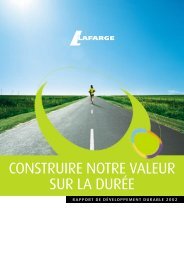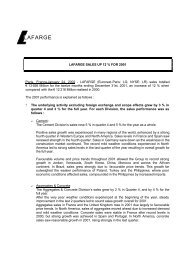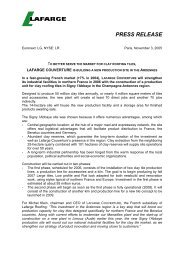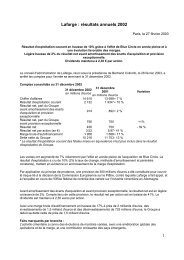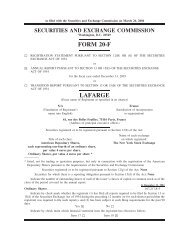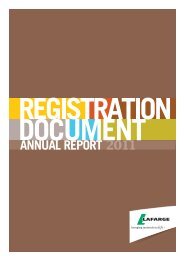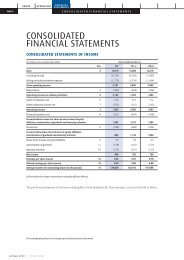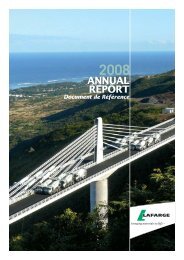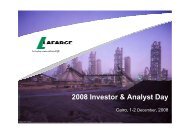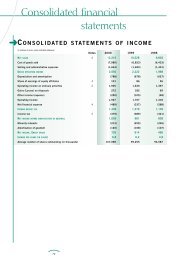2005 Sustainability Report - Lafarge
2005 Sustainability Report - Lafarge
2005 Sustainability Report - Lafarge
You also want an ePaper? Increase the reach of your titles
YUMPU automatically turns print PDFs into web optimized ePapers that Google loves.
DIALOGUE WITH EMPLOYEE<br />
REPRESENTATIVES<br />
<strong>Lafarge</strong> European Works Council<br />
celebrated its tenth anniversary in <strong>2005</strong>.<br />
Following the signature in 2003,<br />
between employee representatives and<br />
the management, of a joint statement<br />
on Health and Safety, a survey of<br />
employee representatives in a dozen<br />
European countries was carried out in<br />
<strong>2005</strong> to evaluate the actual substance<br />
of the Group's commitments.<br />
PERCENTAGE OF EMPLOYEES INFORMED / CONSULTED<br />
ON LOCAL POLICIES OR PROCEDURES IN <strong>2005</strong><br />
93%<br />
77%<br />
Health<br />
& Safety<br />
This survey received 344 responses and<br />
the following results: for instance, 84%<br />
of responses to the question “Are the<br />
Group's safety commitments generally<br />
applied at your plant?” were positive.<br />
This survey also brought to light two<br />
levers for action: improvement in safetyrelated<br />
introduction procedures at sites<br />
and the extension of resources made<br />
available to subcontractors to provide<br />
safety training to their employees.<br />
● Information<br />
● Consultation<br />
All our safety actions are assorted with information and awareness-raising campaigns.<br />
The 93% information rate reflects the systematic generalization of the awareness raising actions<br />
towards our employees concerning safety issues. In many countries where the Group is present,<br />
employee representation is not compulsory. The Group has therefore been promoting voluntary<br />
employee information / consultation procedures for many years.<br />
* LFT, quality, equality in the workplace.<br />
83%<br />
72%<br />
Employment<br />
& Staff<br />
classification<br />
90%<br />
75%<br />
52% 47%<br />
Compensation Others*<br />
I appreciate the improvement of reporting regarding the promotion of diversity and disabled people.<br />
I also welcome the information on training, although I would be interested to learn more about the<br />
content of training programs for non-managers, and how they fit in career development. Regarding<br />
restructuring, I would like to know which countries and businesses are affected, how <strong>Lafarge</strong> anticipates<br />
and mitigates the social impacts of these changes, and how employees and their trade unions are<br />
consulted. As for social dialogue broadly speaking, initiatives at Group and European level are well<br />
reported. For future reports, I look forward to more details on local practices, especially in risky countries,<br />
and a description of how the unions are involved in monitoring the four-way agreement.<br />
REINFORCEMENT OF<br />
THE GROUP'S WORLDWIDE<br />
COMMITMENT TO<br />
A RESPONSIBLE SOCIAL<br />
POLICY<br />
<strong>Lafarge</strong> and three international union<br />
federations, the ICEM 1 , the IFBWW 2<br />
and the WFBWU 3 signed a four-way<br />
international agreement on September<br />
12, <strong>2005</strong> concerning <strong>Lafarge</strong>'s approach<br />
to social responsibility and international<br />
labor relations, which will apply to the<br />
80,000 employees and 76 countries in<br />
which the Group is present. A pioneer<br />
in this type of program, <strong>Lafarge</strong> wants<br />
to uphold the fundamental social rights<br />
defined by the ILO 4 , and contributes<br />
to raising international social standards.<br />
A reference group made up of <strong>Lafarge</strong>’s<br />
management and the unions concerned<br />
will follow the agreement and make sure<br />
it progresses. The group will also promote<br />
social dialogue without neglecting the<br />
Group’s global performance.<br />
1 | ICEM: International Federation of Chemical, Energy,<br />
Mine and General Workers' Unions.<br />
2 | IFBWW: International Federation of Building and Woodworkers.<br />
3 | WFBWU: World Federation of Building and Woodworkers Unions.<br />
On December 9, <strong>2005</strong>, IFBWW and WFBWU created a new global<br />
union federation, the Building and Wood Workers International –<br />
BWI, that groups together around 350 trade unions representing<br />
around 12 million members in 135 countries.<br />
4 | ILO: International Labour Organization.<br />
MARION HELLMANN<br />
BWI<br />
PANEL<br />
LAFARGE | <strong>2005</strong> SUSTAINABILITY REPORT | PAGE 33



